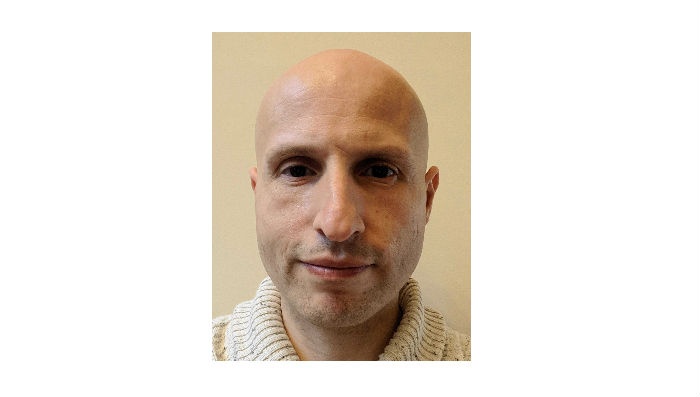Alexander Sack started his career working on operating systems and system programming, but it was his love for gradient descent that led him on the path to becoming a Machine Learning Engineer for Corteva Agriscience. Here, he wields the power of artificial intelligence to help feed the world. He’s also a volunteer Data Expert who worked with Riders for Health, one of our expert partners under our Frontline Health Systems Impact Practice. He holds a Bachelors and Masters in Computer Science from Stevens Institute of Technology with high honors.
To learn more about Alexander’s journey with Riders for Health (and his love for heavy metal), in his own words, read on!
Tell us a little bit about yourself and your background.
When I graduated, I wanted to work on operating systems (mainly UNIX and its derivatives). I spent a good part of my career writing device drivers and doing a lot of low-level systems and performance work. But, in 2016, I read the article, “The Great A.I. Awakening”, and that changed everything! I couldn’t believe the progress that was being made in the area of machine learning, particularly deep learning. I immediately wanted to get involved and started my long journey of switching my career to be more focused on data science than just core software engineering work.
Can you briefly describe the project that you’re currently working on?
Riders for Health (Riders) is a globally recognized organization that focuses on delivering health and testing services to remote areas in rural Africa. They do absolutely amazing work! A major pain point in Riders’ operations has been the slow processing of paperwork and manual record-keeping. Riders’ couriers have to manually copy certain important pieces of information about their transported samples/results into their logbooks (e.g. patient id, sample type, date). They were looking for ways to optimize the paperwork by exploring the use of optical character recognition (OCR) as a solution. To see if that was possible, Riders partnered with DataKind to explore using OCR to optimize their services.
What surprised you most about the project?
When we started this project, I thought that we would have a huge pool of document images to analyze and work with. We didn’t have enough and while this presented a few challenges, we were able to overcome these early on to design a solution. I was also pleasantly surprised at the diverse background of my teammates and, in retrospect, glad DataKind brings a lot of different voices to a project. Oh, did I mention having to deal with a global pandemic in the process, too?
What is the highlight of the project so far?
Interacting with the other volunteers and getting to know them and their backgrounds. At the end of the day, volunteering is a social activity to a certain extent, so it makes a project way more enjoyable if you work with great people (which the DataKind community has tons of).
What were the most challenging moments from your project (and how you resolved them)?
Data scarcity. We needed to look for off-the-shelf models we could use or modify instead of trying to train a complete custom model from scratch.
What professional skills (non-data science) have been most useful for this project?
Communication. It’s important to have good soft skills when working on a project with a lot of folks from diverse backgrounds.
What’s your experience been collaborating with other volunteers on the project and/or working with the DataKind Global staff?
This is, by far, the highlight of volunteering at DataKind – the people. All of the people I interacted with, from the moment I was interviewed to our weekly check-ins to even talking to Riders, were fantastic! I cannot stress how gracious, professional, and just a joy it was to interact with everyone. The DataKind community is really special in that sense and our project leader was truly amazing! She should lead all projects all the time!
What was the most interesting observation you made about challenges that nonprofits face?
Funding. I know this answer is obvious but it is still very true. Nonprofits typically don’t have huge budgets so they need to spend their resources accordingly, determining where they can make the most impact. To a certain extent, that’s also why DataKind’s mission is so vital to the community at large.
What advice would you like to share with volunteers who are new to DataKind or the Data for Good movement?
Education. I think part of volunteering is not just to do data science and pop out a result but to actually interpret and explain the results in a form that is understandable by the client. I think this aspect of a project is just as important as the results themselves. This also means setting realistic expectations and clear goals with the client so volunteers can stay focused on delivering impactful results – don’t let perfection be the enemy of the good!
What’s your favorite movie?
Casablanca. Pure magic.
What’s the best concert you ever attended?
When I was fifteen years old, I skipped high school with two friends to go into the city via train and donate cans of tomatoes for backstage passes to meet Megadeth. Heavy metal for good?
Our volunteers are the lifeblood of our mission. They’ve inspired people to use their skills in ways they never dreamed of. They’ve slayed misconceptions. They’ve shown organizations trying to make the world a more humane place how data science and AI can change the game. We’re honored (and thrilled) to feature their stories in DataKind’s Volunteer Spotlight series. Follow this series to learn about their impeccable skill sets, their work with our brilliant project partners, and what inspires them to give their time, resources, and energy to causes that matter.



